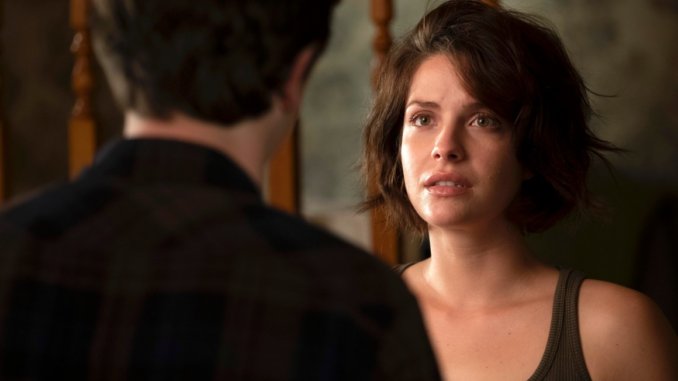
The Good Doctor” showrunner David Shore throws everything at Dr. Aaron Glassman (Richard Schiff). He just underwent surgery for a brain tumor, but Monday’s episode deals with another kind of trauma when he starts interacting with a hallucination of his dead daughter Maddie (Holly Taylor).
“We wanted an opportunity to deal with what is the most important event in his life and his own unresolved issues,” Shore said. “This seemed like an opportune time as he is himself facing his own mortality.”

Glassman’s hallucination stems from the a combination of brain surgery and extreme sleep deprivation, with psychosis as the result. “ICU psychosis is fairly common. Psychosis obviously can mean many, many things, but sleep deprivation can cause the onset of it,” said Shore. “You experience all this as if it is completely real. It can be disturbing.”
Conversation between father and daughter becomes increasingly distraught as they discuss the events leading to the day she died. Maddie had been using drugs, but never went to rehab because Glassman felt he could be a hero and fix the problem himself. After yet another frustrating fight, he locked her out of the house. This led to her death and to his wife leaving him. The combative hallucination Glassman experiences finally makes him face the blame he’s felt ever since.

“We knew he felt a sense of responsibility, we also knew it’s a lot more complicated than that and we wanted to explore that,” said Shore. “There were a lot of conversations between me and David Hoselton who wrote the episode about the guilt and anger and denial. There had to be all those things — the denial, facing the truth, and being able to deal with the truth — in order to move forward. This is the sort of thing that can never be completely resolved, but I think in the course of this episode, he realizes the things that his anger wasn’t allowing for.”
“The Good Doctor” showrunner David Shore throws everything at Dr. Aaron Glassman (Richard Schiff). He just underwent surgery for a brain tumor, but Monday’s episode deals with another kind of trauma when he starts interacting with a hallucination of his dead daughter Maddie (Holly Taylor).
“We wanted an opportunity to deal with what is the most important event in his life and his own unresolved issues,” Shore said. “This seemed like an opportune time as he is himself facing his own mortality.”
Glassman’s hallucination stems from the a combination of brain surgery and extreme sleep deprivation, with psychosis as the result. “ICU psychosis is fairly common. Psychosis obviously can mean many, many things, but sleep deprivation can cause the onset of it,” said Shore. “You experience all this as if it is completely real. It can be disturbing.”

After repeated attempts to get back into her good graces in this episode, Shaun is honest with her. “I don’t care what happened in Hershey,” he says, “But I care that you care.” This is apparently enough for a truce, and the two celebrate by singing karaoke in his apartment.
“Shaun is learning that she is somebody with whom he’s in a relationship,” Shore said. “He is making missteps but he values that relationship and he’s learning how to navigate that relationship.”
On “The Good Doctor,” the neurotypical characters without autism also learn from Shaun’s unique way of interpreting the world. Shore said, “Lea learns the value of candor and their friendship. I think the thing that she responds to with Shaun is he’s just Shaun. He doesn’t try to be somebody he’s not, he doesn’t try to please her. When he makes that statement at the end that ‘I don’t care, but I do care that you care,’ the first half of that statement could be devastating for somebody else, and it arguably is, but the truth in the second half is what she values and what she wants from him.”
Shaun’s progress can be inconsistent though. In the episode’s last moments, just as the two friends begin to sing, Shaun spills some information that he apparently thinks is good news: He rented the two-bedroom apartment that Lea liked but couldn’t afford, and it’s intended for both of them to share.
“We’re never satisfied with leaving things perfect because they never are,” said Shore. “He does something wonderful and then oversteps at the same time. Those little victories and the little steps forward mean so much, but the little steps backward also mean so much.”
